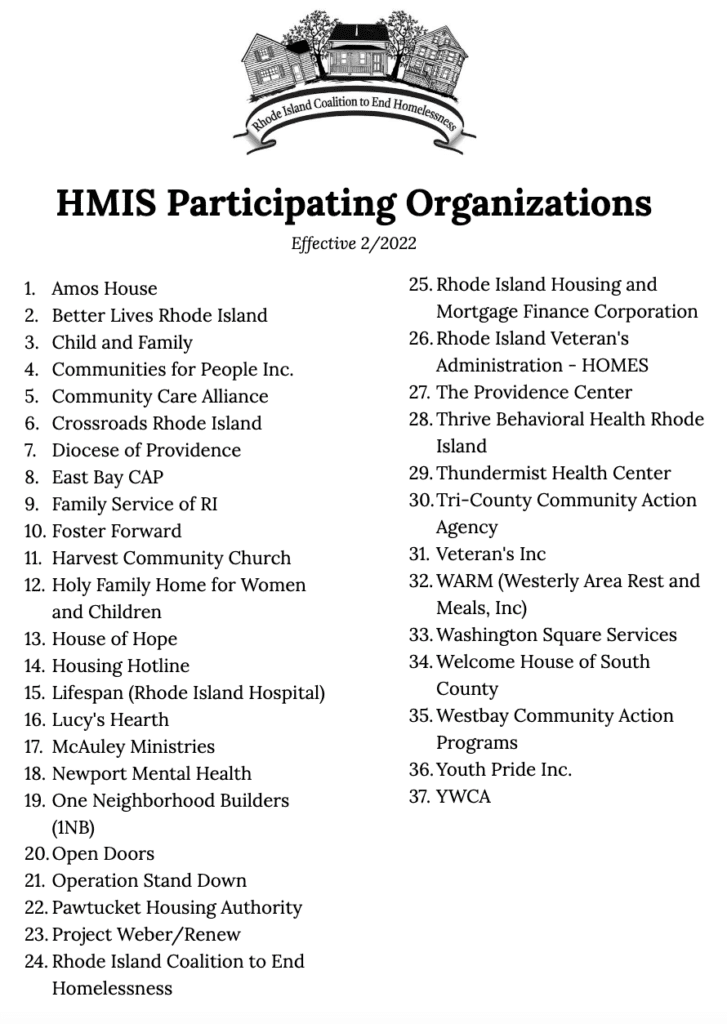Search Posts
Recent Posts
- Rhode Island Legislature Highlights Accomplishments for the 2025 Session June 25, 2025
- Sports in RI: Cody Tow, Volleyball Past, Present and Into His Future – John Cardullo June 25, 2025
- Need a Break? Time for Sour Grapes – Tim Jones June 25, 2025
- Rhode Island Weather Forecast for June 25, 2025 – Jack Donnelly June 25, 2025
- It is what it is: Commentary on 6.25.25 with Jen Brien June 25, 2025
Categories
Subscribe!
Thanks for subscribing! Please check your email for further instructions.

Homeless in RI: Not over in spring, children living outdoors, more shelters, more tents, deep audits
Expanding 24-hour Warming Stations and Overnight Shelters
The RI Department of Housing in partnership with the Executive Office of Health and Human Services (EOHHS) on February 10th issued a memorandum to pre-existing Consolidated Homeless Fund (CHF) vendors requesting letters of interest (LOI) to expand 24-hour warming stations and overnight shelters to help address the current and projected needs of persons experiencing homelessness.
“Providing these resources for 24-hour warming stations and expanded overnight shelter is another step we are taking to reduce unsheltered homelessness throughout Rhode Island,” said Governor Dan McKee. “I remain committed to investing in partnerships to carry out this important work.”
“It is important to expand warming center and shelter operations to additional locations given the continuing need,” said Secretary of Housing Stefan Pryor.
The deadline for CHF vendors to submit letters of interest is TODAY, Friday, February 17th, at 2:00pm. An optional information session will be held via Zoom on Tuesday, February 14, at 11:30.
Examples of eligible activities for funding may include, but are not limited to, staffing, client supports, equipment, renovations to expand capacity, and more. EOHHS is providing funding for supportive services that meet approved opioid mitigation and abatement activities.
RINewsToday asked the question if this new round of funding includes extending beyond the April deadline for closing emergency shelters – “No such implication is intended at this time.”
___
Homelessness does not end in April?
The “warming stations” terminology implies that these are temporary and will close – the state has said in April, though this is not clear if it is the beginning – or the end – of the month. With more encampments being seen all around the state as the weather has moderated, what will happen in April? With the Coalition to End Homelessness openly raising funds for tents and sleeping bags, will we be seeing colorful tent cities popping up in our communities? Already Pawtucket, Cranston, Smithfield, Providence, and other cities are seeing small clusters of tents where there were none a few months ago. What will happen in spring and summer? Homelessness isn’t going to end. But the emergency shelters will. The Armory, in particular, has its developer waiting for immediately beginning refurbishment as a “destination location” for Rhode Island, as yet unspecified.
___
RI Coalition to End Homelessness explains homelessness to Commission
The Rhode Island legislature has a special commission to begin to hear testimony on the issue of homelessness in Rhode Island. Two days ago, the Coalition to End Homelessness made a presentation to the RI Special Legislative Commission to Study Low & Moderate Income Housing. It included a Powerpoint presentation and testimony from a formerly homeless woman.
Children living outdoors
In December, DCYF in RI issued a letter to the RI Coalition to End Homelessness informing them – and all of us – of the responsibility to report children who are living in a neglectful situation within 24 hours of their knowledge.
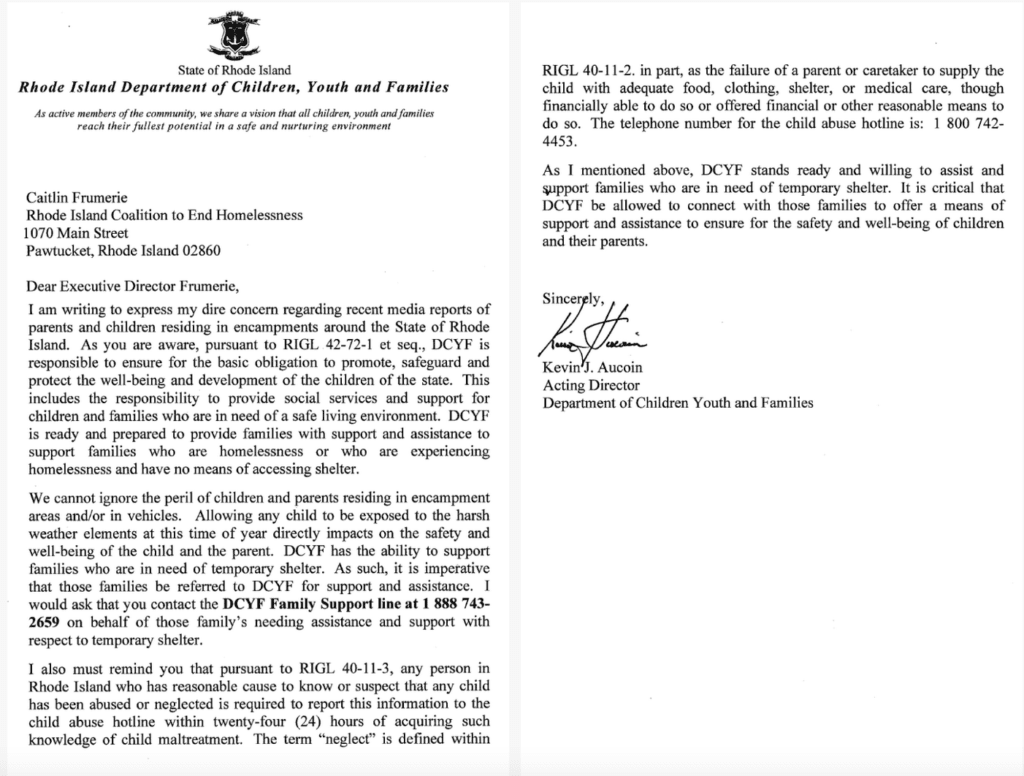
The issue of homeless families – families that include children – was addressed in two slides, noting statistics from “last week”. The first, below, noted that there are 64 families with children “all living outdoors” and waiting for shelter/emergency housing.
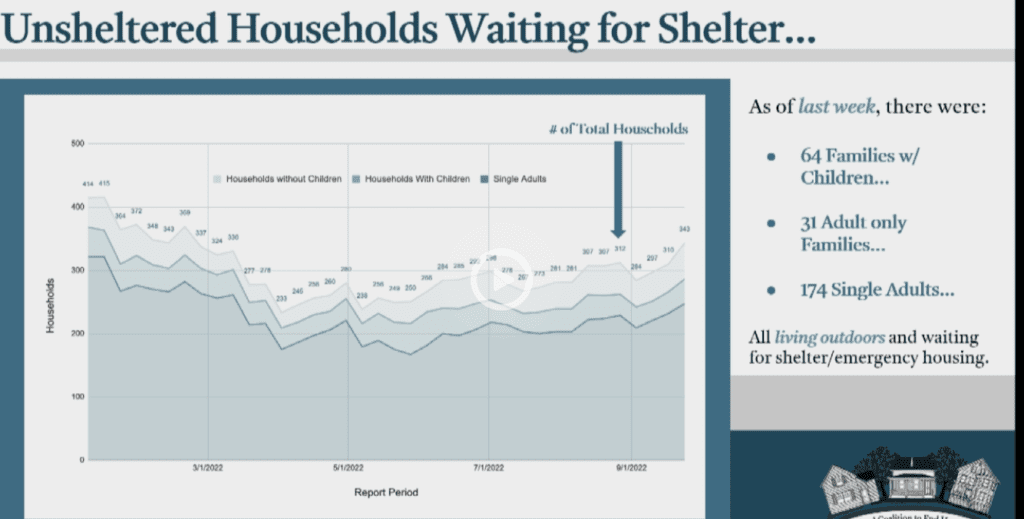
On another slide the Coalition addressed supply vs. demand. Even though Governor McKee and new “housing czar” Stefan Pryor have said publicly several times that there is a bed, indoors, for every homeless person who wants one, the Coalition has consistently said there is not, and this slide notes that “on any given month there is a deficit of 39 emergency housing units – shelter, hotel room, etc – to meet the needs of just those residing outdoors.
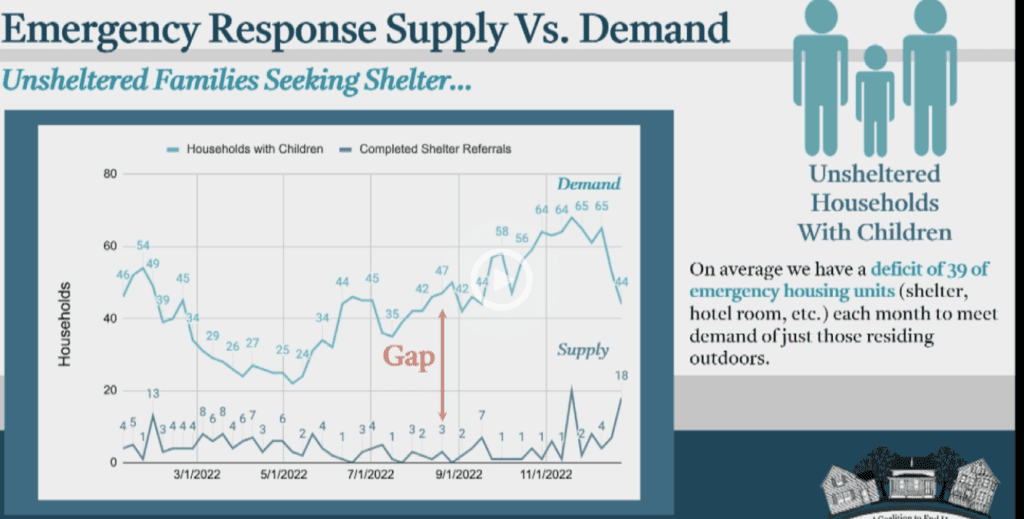
Listen to portions of the testimony that speak to 3 issues – encampment data, families with children living outdoors, and why children can stay there
#1 – why the Coalition to End Homelessness says it has no data on where there are encampments:
#2 – details the number of families living outdoors:
#3 – why the Coalition believes children living outdoors cannot be removed for that reason alone:
RI DCYF’s reaction to Coalition statements
RI DCYF was contacted about the testimony of fact that there are children homeless living outdoors and that families are hesitant to come forward out of fear of losing their children to the state. We provided DCYF with the audio selections and the full audit and transcript. Damaris Teixeira, Public Information Officer, State of Rhode Island, Department of Children, Youth & Families asked for a clarification of the question which was provided – and then did not respond to the deadline of last night.
Notably, on DCYF documents there is a policy statement that if the only reason a child is being “neglected” is that the family lacks housing, then DCYF’s first step would be to provide that emergency housing while it works with the family. This may be a different program accessible to families with children in this situation.
Listen to the full testimony here. Click on the link below the photo:
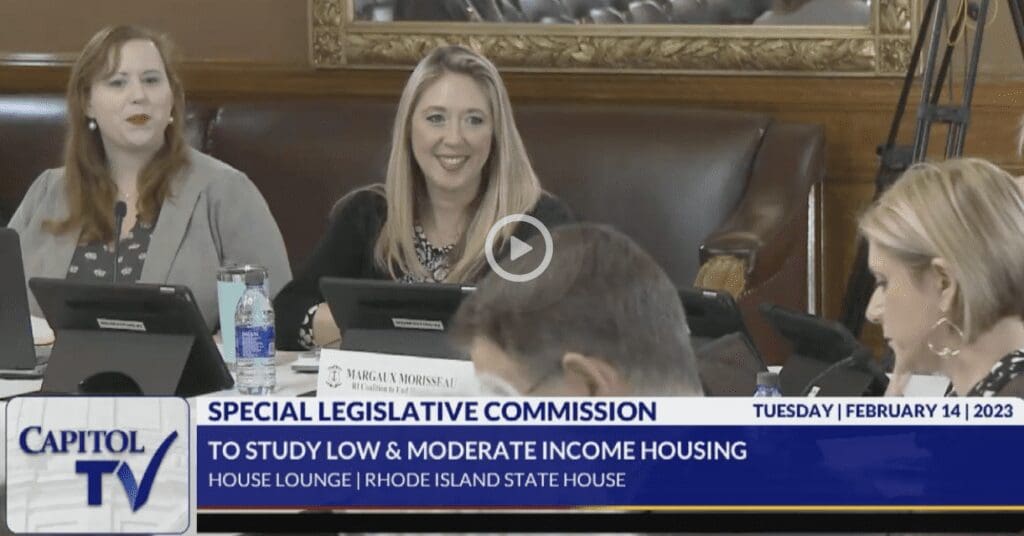
https://ritv.devosvideo.com/show?video=a5638a7f238c&apg=3e2d975f
Response from Rep. Chippendale to the presentation:
Rep. Chippendale questioned the absence of serious mental health disorders and drug addiction to the list of homelessness causation, rather saying it is due to institutional racism. 46% of the population have NO income – this statistic is glaring in that it means the people are not well enough to even apply for benefits they are eligible for. The refusal of the group to divulge and justify why they can’t say where encampments and more shows that they are more into advocacy than solving the problem. An audit of how money was spent is essential.
___
Is it time to amend the Homeless Bill of Rights?
In 2012, Rhode Island became the first U.S. state to pass a Homeless Bill of Rights , thanks to the leadership of the Rhode Island Homeless Advocacy Project (RIHAP), an organization that was led by people who have experienced homelessness or were currently experiencing homelessness.
Eleven years ago there was not the issue of fentanyl and drug overdose that there is now. It is common to revisit bills from time to time to update them and amend them to bring them current with the times. In particular (1) and (7) are points mentioned to be amended:
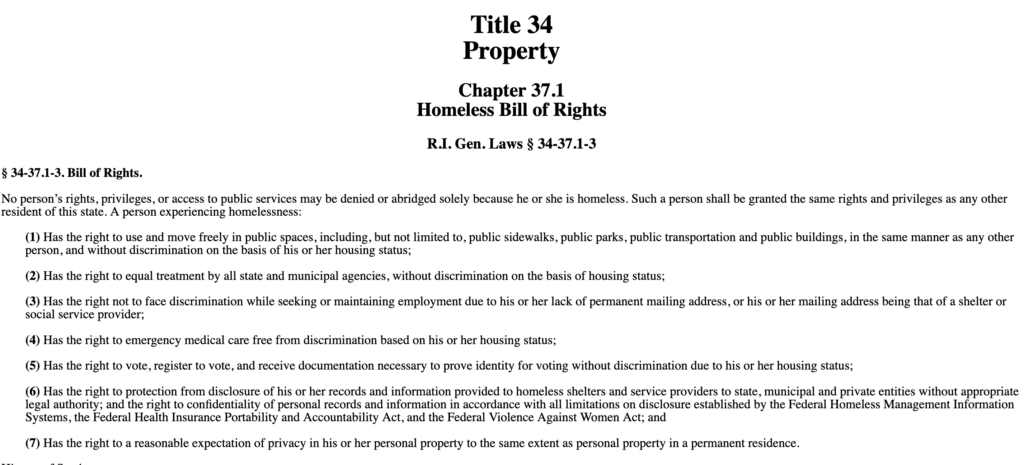
___
Lack of encampment disclosure to Governor of Rhode Island and Housing Agency
While the Coalition speaks repeatedly about disclosing specific identifying information to “others”, their policy clearly would provide for location-only encampment lists and perhaps more – as noted on their own site as disclosure to their clients:
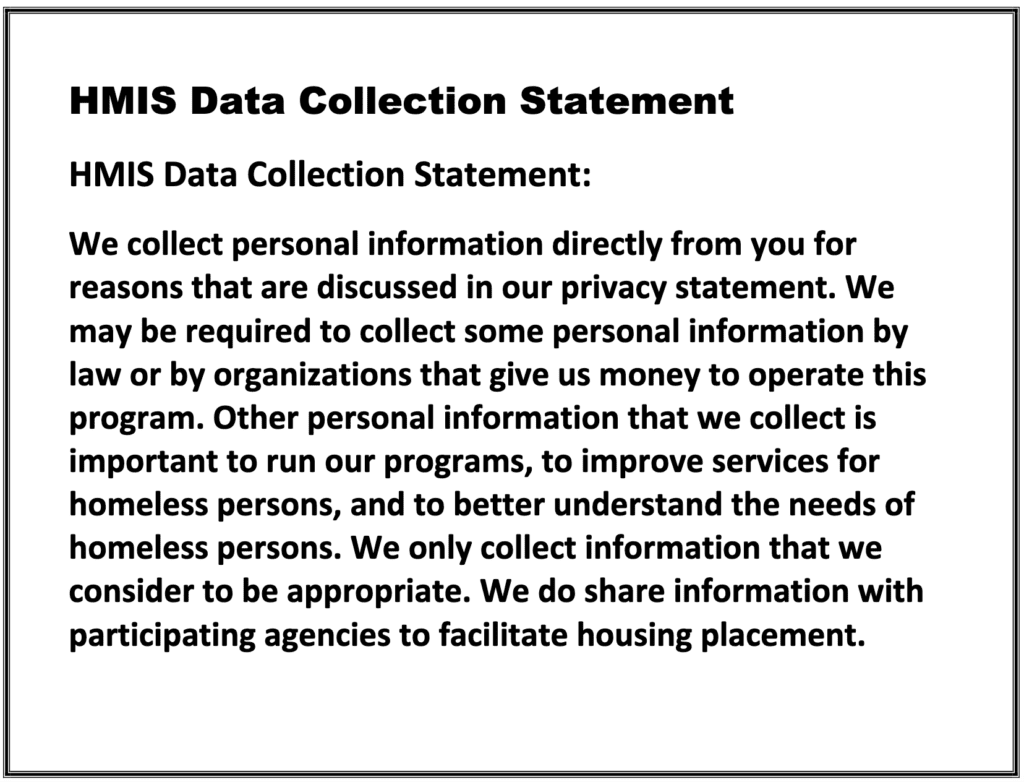
___
Homelessness Funds Audit
A huge amount of money – millions – from federal and state sources have been funneled into the homeless issue in Rhode Island. With such significant differences in approach from agencies funded by both sources and responsible to the people of Rhode Island, an audit and ROI should be done of all agencies charged with this mission. Included should be salary reviews, staffing size and structure, reporting mechanisms to the agencies funding them (the state), and a comparison of effectiveness over the years vs. budget allocations.
The Coalition notes some general budget and staffing/service structure on their website:
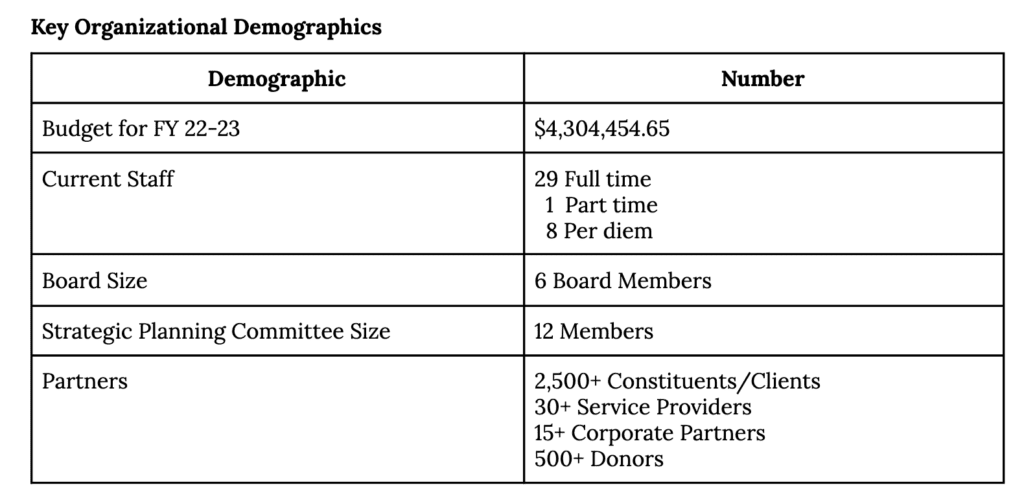
This is just one organization serving as a management umbrella to others. On their website they list the over 40 other groups they work with:
“Presently, we have nearly 40 organizations (and growing) and over 200 HMIS users in Rhode Island gathering information on HMIS to better inform policies and the general public alongside aiding in improving our society overall.”
